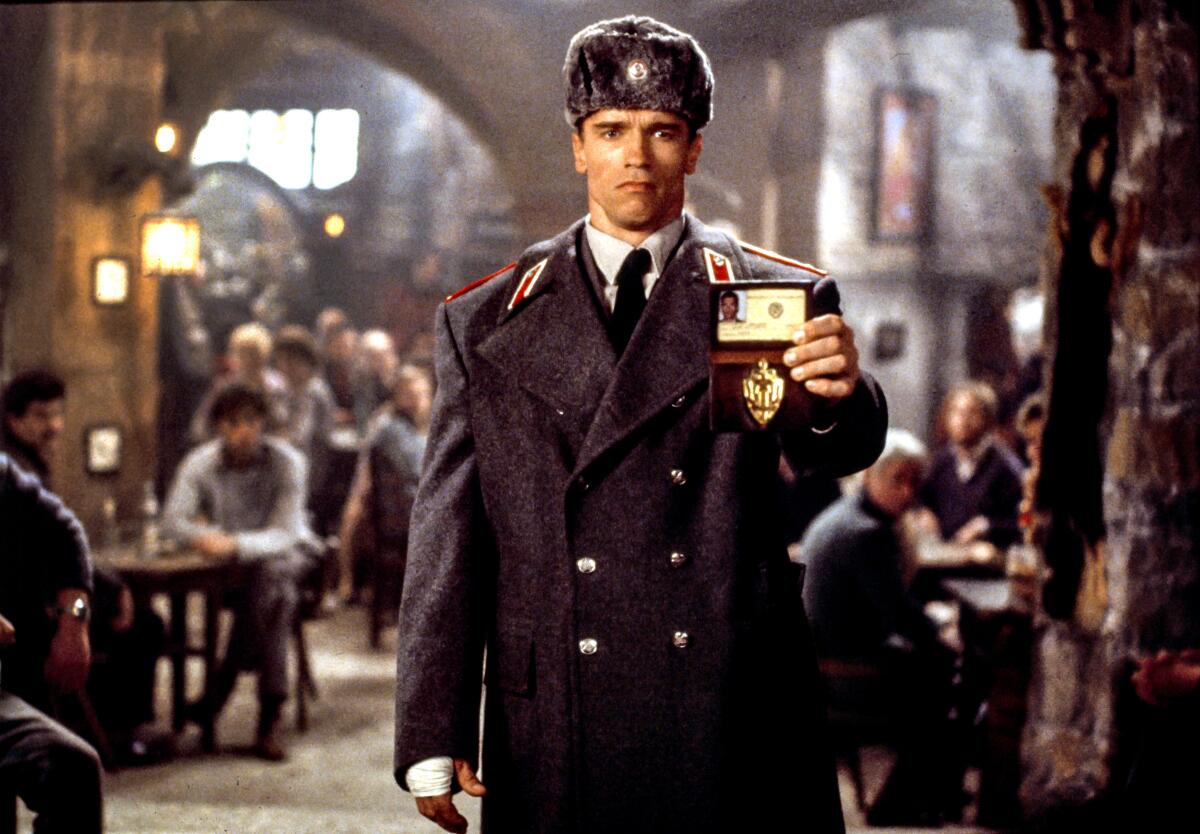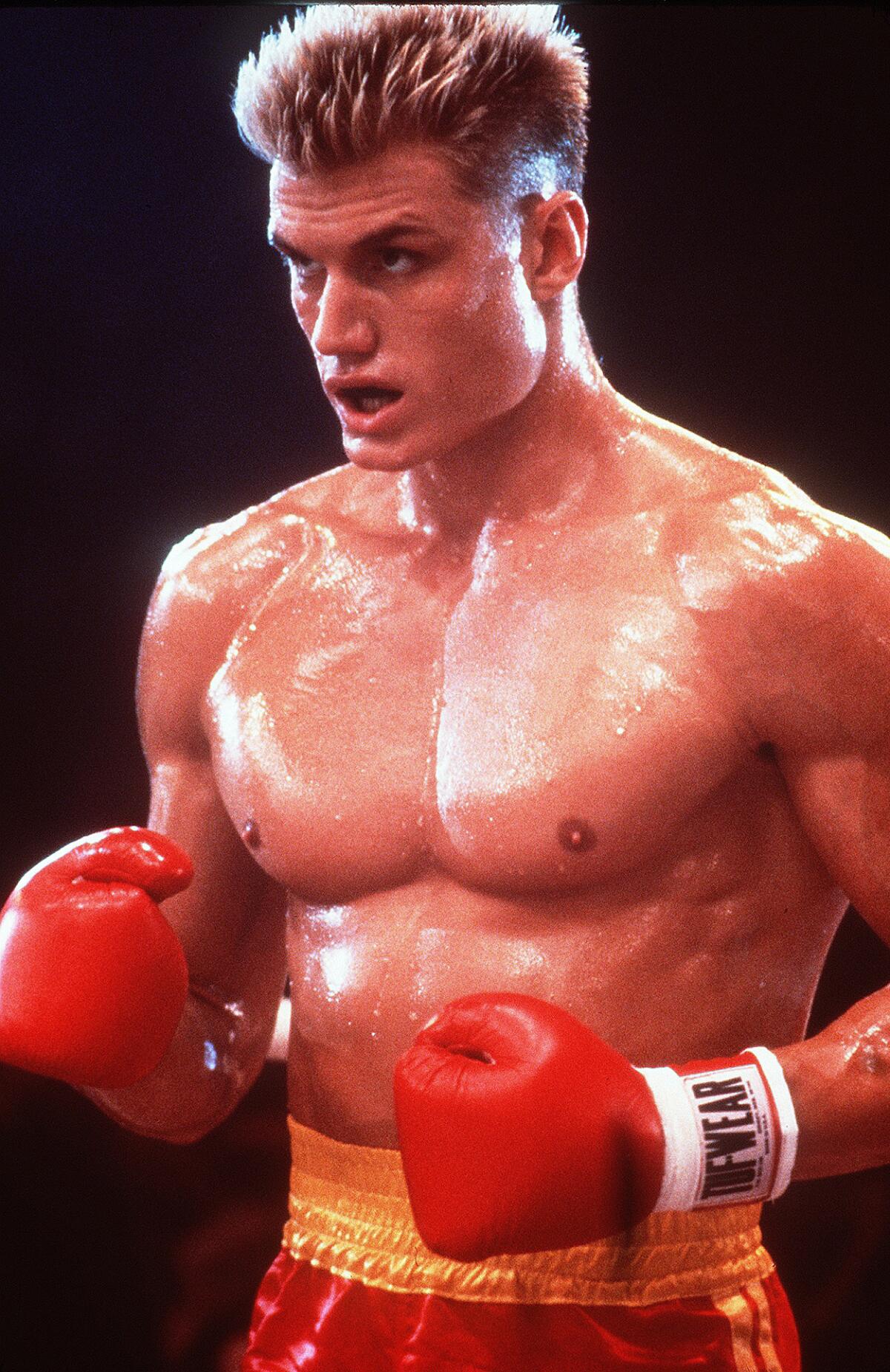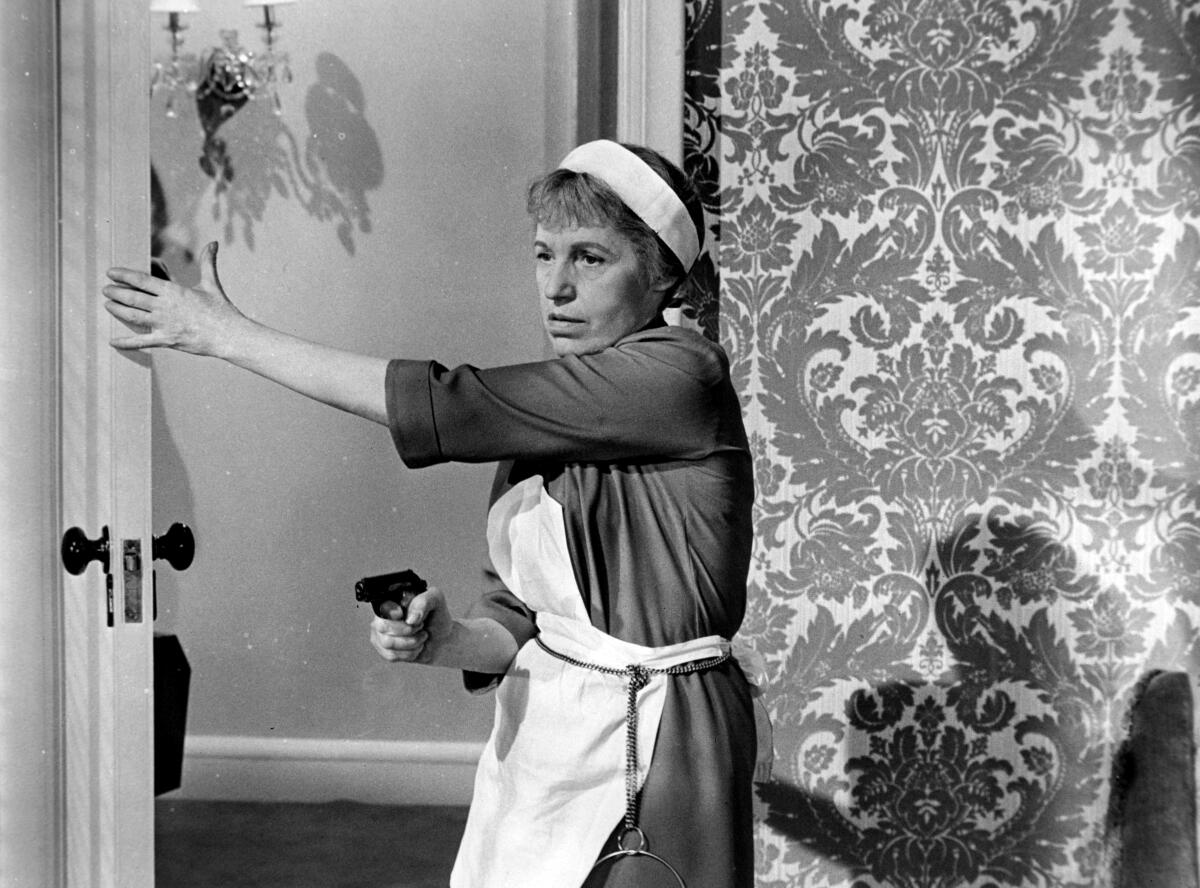In Hollywood, the ‘evil Russian’ stereotype isn’t back. It never left

- Share via
For decades in Hollywood, Soviets were the perfect enemy. Inscrutable, humorless, but just enough like Americans to feel like you’re not punching down — an uncanny-valley Borg version of ourselves. Iconic villains like Lotte Lenya’s Rosa Klebb in “From Russia With Love” or Dolph Lundgren’s Ivan Drago in “Rocky IV” (and his benevolent Gorbachev-era cousin, Arnold Schwarzenegger’s unsmiling supercop in “Red Heat”) commanded campy awe; it’s a bit telling that they were played, respectively, by a German, Swede and Austrian.
Now that Putin’s Russia is the undisputed aggressor in Ukraine, that old image gains sudden currency, as even Russians are realizing with horror: “If I saw the [invasion] on a Netflix series a week ago,” writes a Moscow acquaintance on Twitter, “I’d be like ‘come on, we haven’t been that evil for 40 years now.’ And now it’s reality.” If you’ve seen the “Are We the Baddies?” meme, from an old British TV skit about two Wehrmacht soldiers struck by sudden clarity — it’s that, writ large and tragic.
Of course, we are supposed to be a bit more sophisticated about ethnic representation these days. We know, in theory, that everyday Russians aren’t all Putin’s mindless minions. We’ve seen the mass protest rallies. We know about Alexei Navalny. We’ve seen great, humanizing works like “The Americans” and “Chernobyl.”
A problem with Putin’s unending hold on power, however, is that it makes “Russian” easy to overlook as an ethnic or cultural identity in favor of a purely political one. A good example: Alex Garland’s “Devs,” which takes place in the Silicon Valley tech sector teeming with immigrants from Asia and Eastern Europe. But while its Chinese and Indian characters are allowed to be themselves in a way that doesn’t predetermine the plot, the Russian is revealed as a government spy by Episode 2. In fact, the only casually Russian character I can recall in the entirety of today’s TV landscape is Anna Volovodov on “The Expanse,” a sci-fi series in which Russia as a country doesn’t even exist.

Seeing Russianness as political and synonymous with Putinism has kept alive the kind of easy stereotyping that’s thankfully been on the wane elsewhere. Film after film depicts the country as either a straight-up Mordor (check out the nearly identical prison hellscapes in “Black Widow” and “Red Notice”), or the birthplace of boorish oligarchs (a particularly British obsession, from “RocknRolla” to “Tenet”) and comely assassins (“Red Sparrow,” “Anna,” “In From the Cold,” “Black Widow” again). This leaves a large cultural community both inside and outside Russia — a community to which, as a Latvian American who’s written and directed films in Russian, I sort of belong — wondering if it has any hope for representation outside of genre villainy.
Typically, cultures try to steer Hollywood’s depiction of themselves using three distinct levers: the distribution market back home, the soft power that comes with producing crossover content, or grass-roots lobbying from the U.S. diaspora.
Russia almost vanquished the old Cold War stereotype the first way. Between 2006 and 2011, its number of movie screens doubled and film revenues were rising at a compound rate of 27% a year — and, unlike China, it didn’t have a quota limiting foreign releases. By 2011 or so Russia was an important enough market to extend the existence of whole franchises like “The Pirates of the Caribbean” past their U.S. expiration date solely because they played well there. Sympathetic characters played by actual Russian actors, like Vladimir Mashkov in “Mission: Impossible — Ghost Protocol,” began popping up. “We won’t be seeing many Russian or Chinese bad guys in the next decade, so viva la North Koreans and rogue terrorists,” producer Lydia Obst wryly noted in November 2013. Within four months, Putin’s annexation of Crimea — or, to be cynically precise, the subsequent cratering of the ruble — put an end to all that.
The Russian film industry’s attempts to soft-power its way to better representation are looking bleak, and Putin’s regime is to blame there as well. Mainstream Russian entertainment is visually slick but as starkly out of tune with the current U.S. concerns and values as, say, South Korean culture is painfully relevant. The Kremlin’s decade-long backslide into state censorship, anti-LBGT laws, and “traditional values” is bearing fruit in blandly white, heteronormative and often casually sexist product. A stray hit like Netflix’s “To The Lake” may cross over on the strength of a high concept, but there will not be a Russian “Squid Game or even “Lupin” anytime soon. And now, of course, there might not even be a Russian Netflix to speak of. (The streamer has announced it’s halting production on several originals it was making with Russian studios, one owned by Gazprom; and most Russian bank cards can no longer be used to pay for the service).

The third way involves a vocal U.S. diaspora — which is almost nonexistent. Speaking now as a former Soviet refugee and a child of refugees, this one is entirely our own fault. We have made zero attempts to puzzle out and delineate what a second-gen Russian culture would be once the accent wears off. So it’s up to us to figure out, and then enforce, an idea of what Russianness looks like outside of Putin’s grasp.
One possible answer would be embracing the for-us-by-us of it all, treating the immigrant milieu as something entirely separate from the “old country.” Director Kirill Mikhanovsky does this splendidly in his 2019 Independent Spirit Award winner “Give Me Liberty,” a heartfelt story set in the Russian community of Milwaukee.
The higher-risk, higher-reward tactic, however, is being demonstrated to us right now by the 115 Russian cinematographers who have just signed an open letter against the Ukraine war. The group, which includes Roman Vasyanov, the DOP of “Suicide Squad” and “Fury,” has shown tremendous bravery in signing and publishing the letter, which is likely to bring on professional and personal repercussions. Ultimately, it falls to Russian creatives from Moscow to L.A. and beyond to disavow, through their art and their actions, Vladimir Putin’s dreary sequel to Soviet villainy. But it also falls to Hollywood to hear them when they do.
Michael Idov is a director and screenwriter whose work includes Cannes title “Leto” and Amazon’s “Deutschland 89.” He lives in Los Angeles.
More to Read
The biggest entertainment stories
Get our big stories about Hollywood, film, television, music, arts, culture and more right in your inbox as soon as they publish.
You may occasionally receive promotional content from the Los Angeles Times.










